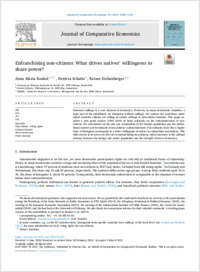Enfranchising non-citizens: What drives natives’ willingness to share power?
BP2-STS
- Koukal, Anna Maria University of Fribourg
- Schafer, Patricia ORCID University of Fribourg
- Eichenberger, Reiner University of Fribourg
- 2021
Published in:
- Journal of Comparative Economics. - Elsevier BV. - 2021, vol. 49, no. 4, p. 1088-1108
English
Universal suffrage is a core element of democracy. However, in many democratic countries, a large part of the inhabitants are foreigners without suffrage. We analyze the conditions under which domestic citizens are willing to extend suffrage to non-citizen residents. This paper explores a new panel dataset (1992–2016) of Swiss referenda on the enfranchisement of noncitizens. We concentrate on the size and composition of the foreign population and the institutional context as determinants of non-citizens’ enfranchisement. Our estimates show that a higher share of foreigners corresponds to a lower willingness of natives to enfranchise non-citizens. This effect seems to be driven by the cost of enfranchising non-citizens, which increases in the cultural distance between the foreign and native population and the strength of direct democracy.
- Faculty
- Faculté des sciences économiques et sociales et du management
- Department
- Département d'économie politique
- Language
-
- English
- Classification
- Economics
- License
- Open access status
- hybrid
- Identifiers
-
- DOI 10.1016/j.jce.2021.03.001
- ISSN 0147-5967
- Persistent URL
- https://folia.unifr.ch/unifr/documents/328589
Statistics
Document views: 73
File downloads:
- 1-s2.0-s0147596721000196-main1: 100
